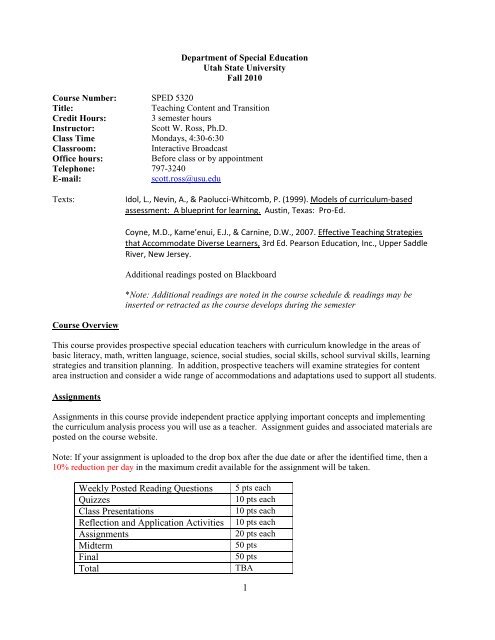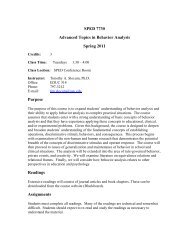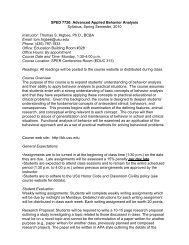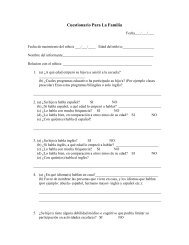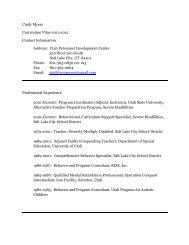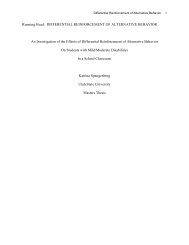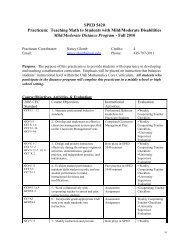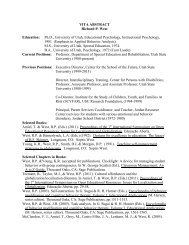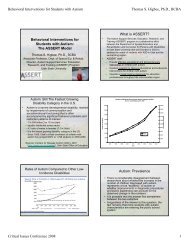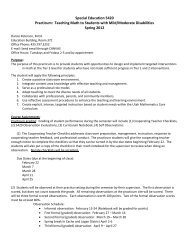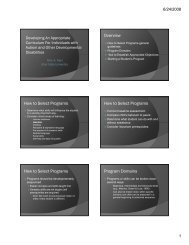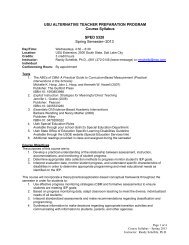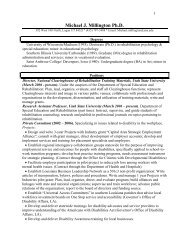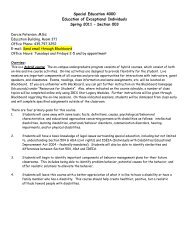1 Weekly Posted Reading Questions Quizzes Class Presentations ...
1 Weekly Posted Reading Questions Quizzes Class Presentations ...
1 Weekly Posted Reading Questions Quizzes Class Presentations ...
You also want an ePaper? Increase the reach of your titles
YUMPU automatically turns print PDFs into web optimized ePapers that Google loves.
Department of Special Education<br />
Utah State University<br />
Fall 2010<br />
Course Number:<br />
Title:<br />
Credit Hours:<br />
Instructor:<br />
<strong>Class</strong> Time<br />
<strong>Class</strong>room:<br />
Office hours:<br />
Telephone:<br />
E-mail:<br />
Texts:<br />
SPED 5320<br />
Teaching Content and Transition<br />
3 semester hours<br />
Scott W. Ross, Ph.D.<br />
Mondays, 4:30-6:30<br />
Interactive Broadcast<br />
Before class or by appointment<br />
797-3240<br />
scott.ross@usu.edu<br />
Idol, L., Nevin, A., & Paolucci-Whitcomb, P. (1999). Models of curriculum-based<br />
assessment: A blueprint for learning. Austin, Texas: Pro-Ed.<br />
Coyne, M.D., Kame’enui, E.J., & Carnine, D.W., 2007. Effective Teaching Strategies<br />
that Accommodate Diverse Learners, 3rd Ed. Pearson Education, Inc., Upper Saddle<br />
River, New Jersey.<br />
Additional readings posted on Blackboard<br />
*Note: Additional readings are noted in the course schedule & readings may be<br />
inserted or retracted as the course develops during the semester<br />
Course Overview<br />
This course provides prospective special education teachers with curriculum knowledge in the areas of<br />
basic literacy, math, written language, science, social studies, social skills, school survival skills, learning<br />
strategies and transition planning. In addition, prospective teachers will examine strategies for content<br />
area instruction and consider a wide range of accommodations and adaptations used to support all students.<br />
Assignments<br />
Assignments in this course provide independent practice applying important concepts and implementing<br />
the curriculum analysis process you will use as a teacher. Assignment guides and associated materials are<br />
posted on the course website.<br />
Note: If your assignment is uploaded to the drop box after the due date or after the identified time, then a<br />
10% reduction per day in the maximum credit available for the assignment will be taken.<br />
<strong>Weekly</strong> <strong>Posted</strong> <strong>Reading</strong> <strong>Questions</strong><br />
<strong>Quizzes</strong><br />
<strong>Class</strong> <strong>Presentations</strong><br />
Reflection and Application Activities<br />
Assignments<br />
Midterm<br />
Final<br />
Total<br />
5 pts each<br />
10 pts each<br />
10 pts each<br />
10 pts each<br />
20 pts each<br />
50 pts<br />
50 pts<br />
TBA<br />
1
1. Each student is expected to post 3 questions about the reading on blackboard by 5:00<br />
the day before class<br />
2. Short weekly quizzes will be given at the beginning of class each week<br />
3. Much of class time will be spent in group discussion and work. Much of this work will<br />
result in class presentations, which will be graded on content as well as delivery<br />
4. The Coyne, Kame’enui, & Carnine book contains Reflection and Application Activities<br />
at the end of most chapters. Those activities are to be completed individually and<br />
turned in at the beginning of class.<br />
5. Assignments will be give that require a curriculum-based assessment on either a<br />
hypothetical student or one from your math practicum.<br />
Assignment Grading<br />
To be fully prepared to apply the content of this course in your future role as a teacher, it is expected that<br />
you earn between 85% and 100% of the points available for each assignment. If you score below 85%,<br />
you may be asked to modify and resubmit. There will be a time limit on resubmission and if you fail to<br />
resubmit by the due date your grade on the assignment will be dropped by 15%.<br />
First and Final Exams<br />
The Mid Term and final exams will be comprehensive of all course materials up to the date of the exam.<br />
Letter grades will be recorded using the following schedule:<br />
A 95 - 100% C+ 78 - 79%<br />
A- 90 - 94% C 75 - 77%<br />
B+ 88 - 89% C- 70 - 74%<br />
B 85 - 87% D+ 68 - 69%<br />
B- 80 - 84% D 60 - 67%<br />
F Below 60%<br />
2
SCHEDULE<br />
The following is a schedule of topics to be covered. Every attempt will be made to keep to this<br />
schedule. You will be notified of changes in advance.<br />
Date Discussion Assignment and Test Schedule<br />
August 30<br />
<strong>Class</strong> 1: <strong>Class</strong> focus<br />
and conceptual<br />
framework<br />
(<strong>Reading</strong>s and Assignments completed BEFORE date)<br />
Syllabus<br />
September 6<br />
September 13<br />
<strong>Class</strong> 2: Features of<br />
effective<br />
educational tools<br />
Labor Day (No <strong>Class</strong>)<br />
Coyne, Kame‘enui, & Carnine, Chapter 1 and 2<br />
post 3 questions/comments from reading<br />
September 20 <strong>Class</strong> 5: <strong>Reading</strong> Coyne, Kame‘enui, & Carnine, Chapter 3<br />
Content <strong>Questions</strong>; Reflection and Discussion Activities; Both<br />
Application Items<br />
Idol Chapter 1: <strong>Reading</strong> CBA’s<br />
September 27 <strong>Class</strong> 6:<br />
Comprehension<br />
Coyne, Kame‘enui, & Carnine, Chapter 4<br />
Content <strong>Questions</strong>; Reflection and Discussion Activities<br />
October 4<br />
(class changes<br />
to 2 hr length)<br />
October 11<br />
<strong>Class</strong> 3: CBA and<br />
Social Skills<br />
<strong>Class</strong> 4: Study<br />
Skills and Survival<br />
Skills<br />
Idol, Introduction<br />
post 3 questions/comments from reading<br />
Kerr, M. M., Nelson, C. M., & Lambert, D. L. (1987). Improving School<br />
Survival Skills. Helping Adolescents with Learning and Behavior<br />
Problems. Columbus, OH: Merrill Publishing. (<strong>Reading</strong> can be<br />
downloaded from Blackboard)<br />
Iris Module: Using Learning Strategies: Instruction to Enhance Student<br />
Learning<br />
post 3 questions/comments from reading<br />
Assignment 1 Due: Effective Social Skills Instruction and CBA<br />
October 18 <strong>Class</strong> 7: Writing Coyne, Kame‘enui, & Carnine, Chapter 5<br />
Content <strong>Questions</strong>; Reflection and Discussion Activities<br />
Idol Chapter 2: Writing CBA’s<br />
• Prepare a writing survey CBA (steps 1-2) and bring to class ready to<br />
deliver<br />
3
October 25<br />
<strong>Class</strong> 8: English<br />
Language Learners<br />
Coyne, Kame‘enui, & Carnine, Chapter 9<br />
post 3 questions/comments from reading<br />
November 1<br />
Mid-Term<br />
November 8 <strong>Class</strong> 8: Math Coyne, Kame‘enui, & Carnine, Chapter 6<br />
Content <strong>Questions</strong>; Reflection and Discussion Activities; Application<br />
Item<br />
Idol, Chapter 4<br />
Assignment Due: Writing Instruction and CBA<br />
November 15 <strong>Class</strong> 9: Science Coyne, Kame‘enui, & Carnine, Chapter 7<br />
Content <strong>Questions</strong>; Reflection and Discussion Activities<br />
November 22<br />
<strong>Class</strong> 10: Social<br />
Studies<br />
Coyne, Kame‘enui, & Carnine, Chapter 8<br />
Content <strong>Questions</strong>; Reflection and Discussion Activities<br />
Idol, Chapter 3<br />
November 29<br />
<strong>Class</strong> 12: Transition Additional <strong>Reading</strong>: Transition Related Instruction – Part 1 (<strong>Posted</strong> on<br />
Blackboard)<br />
post 3 questions/comments from reading<br />
December 6<br />
Final <strong>Class</strong><br />
<strong>Class</strong> 13: Transition Iris Module: School Counselors: Facilitating Transitions for Students with<br />
Disabilities from High School to Post-School Settings<br />
post 3 questions/comments from reading<br />
Assignment Due: Community Resources and Transition Plan<br />
December 13<br />
Final<br />
With respect to the No Child Left Behind “highly qualified” teacher requirements, all material presented in<br />
this course falls neatly into four categories: a) content special education personnel teach; b) content regular<br />
education personnel teach; c) content special and regular education personnel can teach and finally, d)<br />
supports that special educators implement in behalf of students with disabilities through collaborative<br />
relationships with regular education personnel.<br />
Course Objectives Evaluation CEC Standards<br />
Common Core (CC) and<br />
Individualized General<br />
Curriculum (GC)<br />
Curriculum Analysis<br />
1. Describe how schooling changes across the life span<br />
and how that effects curriculum organization and<br />
structure in special education programs.<br />
2. Identify a range of important skills and knowledge in<br />
the areas of basic literacy, school survival, social<br />
skills, various content areas and transition planning.<br />
4<br />
Quiz 1; Midterm<br />
Assignments 1-6<br />
CC2;K7<br />
CC4;K5,6<br />
GC1;K6<br />
CC2;K1<br />
CC4;K3<br />
CC6;K4
3. In each area, use a curriculum analysis process that<br />
includes developing curriculum based assessments,<br />
determining goals and objectives, developing a<br />
monitoring system, and using effective teaching<br />
strategies.<br />
4. Use case study material to exemplify the curriculum<br />
development process in a range of skill areas for a<br />
Quiz 1; Midterm<br />
Assignments 1-6<br />
Assignment 1<br />
student with mild/ disabilities.<br />
<strong>Reading</strong> and Writing Skills<br />
1. Describe how to assess reading and writing skills. Quiz 2-5; Midterm<br />
CC4;K4<br />
GC4;K9,S4,S5,S6<br />
CC4;K1,2;S1,2<br />
GC4;K1,S15<br />
GC5;S5<br />
GC4;K5<br />
2. Plan a writing program to meet the needs of a student Assignment 3<br />
with mild moderate disabilities<br />
Learning Strategies<br />
1. Identify the critical features of a learning strategy. Quiz 12; Final CC4;K4<br />
2. Describe learning strategies appropriate for enhancing<br />
students’ success in general education classes.<br />
Quiz 1-15 CC4;K1<br />
GC4;K7<br />
3. For at least one learning strategy, develop a<br />
curriculum based assessment, a monitoring system<br />
and an instructional plan to teach the strategy.<br />
Assignment 6 CC4;S5<br />
CC3;K9<br />
Content Area Instruction<br />
1. Describe how to use an effective teaching cycle in<br />
content area instruction.<br />
2. Describe typical content enhancements that teachers<br />
may use with an entire class that are likely to improve<br />
performance of students with disabilities.<br />
Quiz 3; Mid<br />
Term<br />
Quiz 2-15; Final<br />
exam<br />
CC5;K2<br />
CC4;S2,4<br />
CC5;K2<br />
3. Develop a CBA CC4;K5<br />
Accommodations and adaptations in the general education classroom<br />
1. Evaluate the setting demands of a content class to<br />
identify the skills and tasks required for success.<br />
Assignment 4 CC4;S9<br />
CC5;S4<br />
2. Use a curriculum modification ladder to adapt<br />
curriculum and instruction for a student in a general<br />
education class.<br />
Assignment 4 CC4;S8<br />
CC5;S2<br />
3. Describe specialized adaptations/accommodations so<br />
individual students may participate in content area<br />
instruction<br />
Social and school survival skills<br />
1. Describe a range of social skills and school survival<br />
skills and the dysfunctional effects when individuals<br />
lack those skills.<br />
2. Describe intervention strategies to teach school<br />
survival skills and social skills.<br />
Quiz 4; Final<br />
exam<br />
Assignment 5<br />
Assignment 5<br />
GC2;K2<br />
GC4;K6<br />
CC4;K3<br />
CC6;K4<br />
3. Describe how to assess social skills and school<br />
survival skills.<br />
Transition Planning<br />
1. Describe transition goals, objectives and curricula<br />
appropriate for students with mild/moderate<br />
disabilities<br />
Quiz 4; Final<br />
exam<br />
Assignment 3-6<br />
Assignment 3-6<br />
GC3;S1<br />
GC5;K1<br />
5
1. Describe community resources available for preparing Quiz 15; Final<br />
students for work, home and community living. exam<br />
2. Use case study material to develop a transition plan. Transition<br />
Project<br />
CC5;K5<br />
CC4;S10,14<br />
GC3;S3<br />
GC4;S23<br />
6


